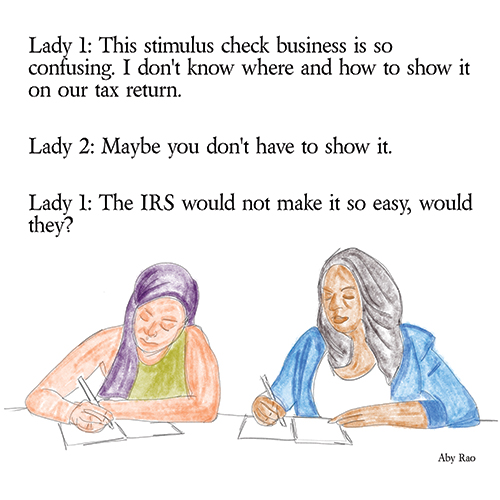
The CARES act passed early last year has created some opportunities for us. We all have heard of the stimulus check, most of us who could fit into the criteria have received one already and I assume that it has come quite handy for many, although it may not be enough. How that will work out as far as the taxes are concerned is still a mystery to many. I am not surprised with that because I don’t think it was explained too well.
In the CARES act, there was a new credit introduced called “recovery rebate” tax credit. Under normal circumstances, when we would file our taxes for 2020, we would get this tax credit. In other words, get some more money as a refund because of this credit passed in the CARES act. Now because of the COVID situation, Congress decided to give each person/family, that qualifies, an advance payment for that credit early in 2020, when it was most needed instead of waiting til you file your 2020 return. That was very nice of Congress to think that way. And it also became very useful for congress to show concern.
So, when you file your 2020 tax return it is all supposed to work out. Depending on the income you show on your return for 2020, your actual “recovery rebate” will be calculated by IRS, then the advance payment (stimulus check) will be subtracted from it and accordingly your “credit” will be adjusted.
This credit is only available for 2020.
Stimulus check amount and the recovery rebate credit are generally calculated the same way. Both start at $1,200 ($2,400 for joint filers) and an additional amount of $500 is added for each child at or under age 16. The credit, according to CARES, fades out gradually when Adjusted Gross Income (AGI) is above $75,000 for single taxpayers, $112,000 for head-of-household filers or $150,000 for married couples filing joint return.

So why is there a problem or a concern? Where the two differ is the actual information the two calculations are based on and the reason for that is IRS just would not have the latest information until you file your 2020 returns. Until then, for most people, IRS calculated the stimulus check amount using the old information like from your 2018 return or if you had filed early in 2019 then from that return. Now if you didn’t file a return for those years but still received Social Security or any other Government benefits, IRS used that information to create the amount for the stimulus check.
The actual credit that you should get is calculated, with some degree of assurance, only when you file your 2020 tax return.
Since the stimulus check was an advance payment of that credit, you will have to subtract that amount from the actual credit to determine if you got too much or not enough. However, there is good news here: if your stimulus check is greater than or equal to the credit, you don’t owe anything to the Government (when has this happened before) but if your stimulus check is less than the credit then you get the leftover credit on your 2020 tax return. Thank goodness, they are not taking anything away, if they over-estimated. This is like heads you win and tails you win too.
Since the stimulus check amount was calculated from either 2018 or 2019 returns and the actual credit will be calculated from the 2020 return that you will file soon, in theory you could still do something to reduce your 2020 AGI. Of course, now most of these suggestions would be applicable to the new LAW that was just passed recently. Let us find the ways we can reduce our AGI. If you haven’t taken the RMD last year because it was not necessary to do so, that would have reduced the AGI. This year too, try to donate an amount equivalent to the RMD directly to the charitable organization and hence reduce your AGI.
Deferring income until the next year will be another strategy. If you have been tempted to cash out stock market gains, perhaps wait til next year. If you are still working and expect a bonus, may be your boss will consider your request to push the payment to next year. Obviously, you don’t want to forgo the income but just postpone it to next year.
Seniors with dependent children under 17 could get a $500 “recovery rebate” credit for each child.
There is another way, unrelated to the recovery rebate credit, where you could claim some donations even if you don’t itemize. Just for 2020 the CARES law allows you to claim a credit for cash donations up to $300 each return even if you don’t itemize. This is a welcome sign, albeit only for 2020, since most of us don’t itemize now because the standard deduction is made so high. So at least for one year we can take advantage of this offer in the LAW. It is for cash donations only and is for per return and not per person. So single or married filing jointly all will claim the same deduction of $300.
Here is another favor CARES law has bestowed upon us. Generally, your medical deduction for the medical expenses would be 10 percent of your AGI; for 2020 tax returns it is reduced to 7.5 percent. So, if you are able to take medical expenses in your itemized deductions that is another benefit to think of. The donation limit is also increased for this year only. It behooves us to take advantage of these special concessions offered; some of them will disappear for 2021.
———-
Mo Vidwans is an independent, board-certified financial planner. For details visit www.vidwansfinancial.com, call +1 (984) 888-0355 or write to mpvidwans@yahoo.com.



